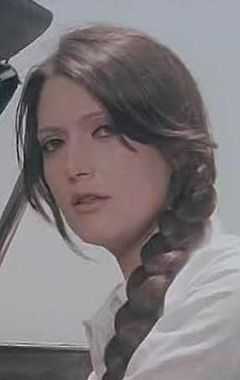Shams al-Baroudi
| Shams al-Baroudi | |
|---|---|
 | |
| Born |
November 4, 1940 Warraq al-Hadar, Giza Governorate |
| Years active | 1961 - 1982 |
| Spouse(s) |
Prince Khalid bin Saud Hassan Youssef |
| Children | Nariman, Mahmoud, Omar, Abdullah |
Shams al-Muluk Gamil al-Baroudi (Arabic: شمس الملوك جميل البارودي) is a retired Egyptian actress who was active in Egyptian films and also Lebanese films during the 1960s and 1970s. Lisa Anderson of the Chicago Tribune described her as "one of the most beautiful and glamorous of Egypt's actresses".[1]
Career
Born to an Egyptian father and Syrian mother, al-Baroudi stuided at the Higher Institute of Dramatic Arts in Cairo for two and a half years and made her cinema debut in Ismail Yassin's comedy Hired Husband ( زوج بالإيجار) in 1961. After a prolific career in the 1960s, she came under spotlight with "transgressive" roles in early 1970s. After marriage to fellow actor Hassan Youssef in 1972, the couple started to work in cooperation until al-Baroudi decided after Umrah in 1982 to quit cinema and wear the hijab.[2] At that time Youssef was still filming Two on the Road (اثنين على الطريق) and after al-Baroudi's unexpected retirement, the film could only be completed and released by 1984.[3]
After retirement
In 2001 Nourah Abdul Aziz Al-Khereiji of the Arab News interviewed al-Baroudi in the 2001 Al-Madinah Festival. Al-Baroudi described her acting era as "the time of ignorance," the name Muslims use to refer to the pre-Islamic era.[4] As of 2004 she was wearing a niqab and her sole television appearances were on religious satellite channels. By 2008 she stopped wearing the niqab and only wore the veil.[5]
Lisa Anderson used al-Baroudi as an example of an increase in social conservatism in Egyptian society.[1]
Personal life
Al-Baroudi married Saudi prince Prince Khalid bin Saud in 1969 and divorced after 13 months.[2] Since 1972, she is married to actor Hassan Youssef.[5] One of their sons, Omar H. Youssef is also an actor.[6]
Filmography
- Pleasure and Suffering ("al-Mutât wal-Âzab", around 1971)[7]
- Malatily Bathhouse ("Ĥamam al-Malaṯily", 1973)[7]
- A Woman With a Bad Reputation[1] ("Emraa Sayyeat Assomaa", 1973)
See also
References
- Habib, Samar. Female Homosexuality in the Middle East: Histories and Representations. Routledge, July 18, 2007. ISBN 0415956730, 9780415956734.
Notes
- ↑ 1.0 1.1 1.2 Anderson, Lisa. "Egypt's cultural shift reflects Islam's pull." Chicago Tribune. March 21, 2004. p. 3. Retrieved on February 21, 2013.
- ↑ 2.0 2.1 شمس البارودى
- ↑ اثنين على الطريق
- ↑ Al-Khereiji, Nourah Abdul Aziz. "Reformed actresses." (Archive) Arab News. Retrieved on Thursday February 21, 2013.
- ↑ 5.0 5.1 Rizq, Hamdi (حمدى رزق). "Renouncing The 'Niqab'." (Archive, Print version, Archive) Translation by Eltorjoman International. Almasry Alyoum. Monday 25 February 2008. Issue 1352. Page 13. Retrieved on February 20, 2013. Original Arabic article: "العودة من النقاب." (Archive, Print friendly, Archive)
- ↑ Agrama, Doaa. "Omar H. Youssef – A Family Affair." (Archive) What Women Want. May 2009. Retrieved on February 21, 2013.
- ↑ 7.0 7.1 Habib, p. 129.
External links
- Shams al-Baroudi at the Internet Movie Database
- Rizq, Hamdi (حمدى رزق) "Shams Al-Baroudi." (Archive) Translated from Arabic to English by Eltorjoman International. Almasry Alyoum. Saturday 22 March 2008. Issue 1378. Original Arabic: "شمس الملوك." (Archive)
- "Actress Shams al-Baroudy releases a statement concerning her husband actor Hassan Youssif." (Archive) Elcinema.com. DAMLAG S.A.E.